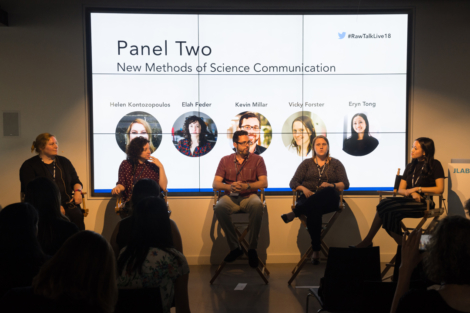Raw Talk Podcast — a project spearheaded by graduate students from The Institute of Medical Science (IMS) at U of T — hosted its first live show at JLABS on May 30. A two-part panel discussion, Raw Talk Live explored the current climate of science communication.
Traditionally, science was communicated through conferences, where researchers in the same or similar fields shared their findings with their peers. The responsibility for communicating this research to the public fell on teachers and science journalists. These days, researchers also communicate their findings outside of the academic community through scientific outreach and the media.
Public engagement in science
Tetyana Pekar, an IMS alum and moderator of the first panel, asked panelists what they thought the status quo for public engagement in science was and how it could be improved. The panelists all felt that the status quo was changing for the better, but that there was room for improvement.
One key concern was that scientific outreach tends to stay within the ivory towers of academia, and getting the general public to take interest in science is an ongoing struggle.
A 2017 survey conducted by the Ontario Science Centre found 47 per cent of Canadians do not believe in or understand the science behind global warming.
“There is this aspect of the public’s awareness of science that’s incomplete and they’re going to celebrities for information and that’s very troubling,” said Dan Weaver, a PhD candidate in the Department of Physics at U of T.
The results from a 2011 analysis indicate that students from underrepresented or underprivileged backgrounds have less access to science outreach initiatives, which further deepens these misunderstandings as these students are likely deterred from learning about science or pursuing a scientific career.
For Doina Oncel, founder of hEr VOLUTION, a non-profit organization in Toronto that empowers youth in underserved communities to enter STEM, outreach means that “We don’t [just] empower people, we give them tools to empower themselves.”
When Weaver and his research team traveled to Nunavut, they conducted science outreach activities with students from a local school. They showed the students how scientific instruments are used in research to make becoming a scientist a more concrete possibility.
Scientists also benefit from engaging with lay audiences about their research.
“I think the patient [and] parent voice in research is important. I think we have stories to tell and things to say that are valued in the research world,” said Connie Putterman, whose journey in science communication began when her son was diagnosed with autism 18 years ago.
The speakers agreed that citizens have a large impact on science policy, and, in turn, on scientific research. According to the Canadian Science Policy Centre founder and CEO Mehrdad Hariri, by creating a culture of public engagement in scientific research through initiatives like citizen science, we can better defend the integrity of science.

STEVEN LEE/THE VARSITY
New methods of science communication
Eryn Tong, a Raw Talk segment host, asked speakers in the second panel what they thought effective science communication would look like in an ideal world.
According to Dr. Vicky Forster, a postdoctoral fellow at SickKids, science should be made more accessible through open access publications and accessible language. The other panelists echoed this sentiment. Especially as one in three Canadians are unable to follow science reports published in the media, creativity is necessary when reporting science accurately and in a way that is understood by non-expert audiences.
“What we’re seeing is that there’s a real appetite… to take content and customize it and make it so that it’s consumable in ways that people can navigate it in [a] non-linear fashion,” said Kevin Millar, Senior Vice President of Creative and Medical Science at INVIVO Communications, a digital healthcare agency that creates visual aids for communicating science.
Millar added that Canada should invest more time and talent into communicating science more effectively and for specific audiences.
Helen Kontozopoulos, co-founder of the Innovation Lab in the Department of Computer Science at U of T, pointed out that bringing different voices to the narrative could also help change the way scientific research is shared.
Elah Feder, U of T alum and co-host of science podcast Undiscovered, added that communicating the scientific process is equally important. “People just see a headline that coffee is bad for you and then next week they see that coffee is good for you and I think [they get confused] because they don’t understand the process,” said Feder.


